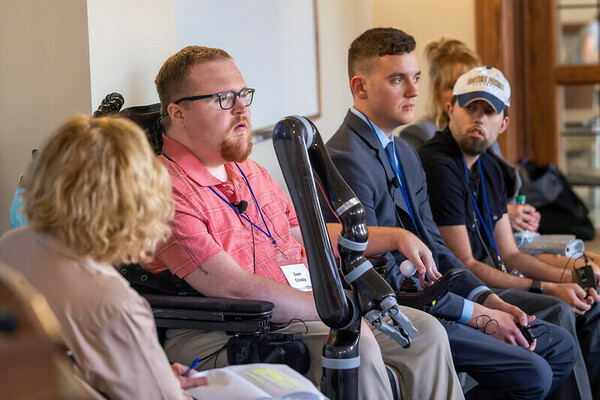Interacting with people who have rare diseases allows students to understand that inclusion of patient voices is crucial to successfully understanding their diseases and bringing about new treatments, according to Barbara Calhoun, co-director of the minor in science and patient advocacy.

Dyne Therapeutics partnered with those in the new minor in science and patient advocacy in September for an inaugural summit. Three people living with muscular dystrophies served on one of the panels during the event. Another panel included students in the minor, and another featured researchers, clinical development, medical affairs and patient advocacy teams at Dyne.
“The primary reason for this summit was to engage Notre Dame students with patient families and biotech executives to find ways that we can ‘together’ advocate for patients,” Calhoun said, adding that only 5 percent of rare diseases have a treatment. “As advocates, we need to ensure that patient needs are heard and implemented.”
According to Dyne’s mission, without communication with the affected groups, biopharmaceutical companies miss out on the relevant creative and critical information that is necessary to successfully impact the lives of those affected by rare disease.
Adviti Bali, a senior majoring in biochemistry and minoring in science and patient advocacy, said the most valuable part of the summit was hearing stories from patients. Spending time with them allows her to learn what she can do to help them as her career unfolds.
“The summit has motivated me to continue doing research on rare diseases, despite many difficulties,” she said. “Meeting patients helps you understand the direct impact our research has on their lives.”
Joshua Brumm ’01, Dyne’s president and chief executive officer, said the leadership team at Dyne learned how patient advocacy is being perceived as an increasingly strategic advantage for students considering careers in health care, and how these relationships are beneficial for them.
“We also heard from the patients and caregivers that their participation in workshops and panels has helped validate their life experiences and the profound impact of their disease burden, and they also share their perspective on ways to improve care,” Brumm said.
Bali was impressed that Dyne representatives showed true care and concern for patients.
“It was nice to see that in this money-motivated world, there are companies that truly value patients and want to help them,” she said. “They place a special emphasis on patient advocacy and it was nice to see my classwork translated to the real world.”